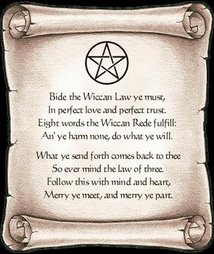Sunday, February 24, 2008
Position Statement on Religious Discrimination in Prisons
Remarks by Wiccan Chaplain Patrick McCollum
Position Statement on Religious Discrimination in Prisons
I would like to thank the Commission on behalf of the Wiccan community and on behalf of minority faiths in general, for offering us the opportunity to contribute to the dialogue on religious discrimination in United States’ prisons. I will focus primarily on the accommodation of Wicca and the discrimination Wiccans face in State and federal prisons, but I would like the commission to recognize that one can easily insert the name of any other minority faith in place of Wicca, and still have the exact same end result. That is, these problems are endemic for all minority faiths that are not in the family of religions of Abraham.
I’d like to start with a few true examples of discrimination to illustrate the severity of the problem:
A Wiccan inmate has cancer and the prison guards refuse to transport him to his chemotherapy treatments unless he removes his religious pentacle medallion which they have objections to. He chooses to forgo his chemotherapy and keep his pentacle.
A Wiccan inmate has been trying to go to Wiccan services for months, but the guard at her dorm refuses to give her a pass. The guard says it is for the good of the Wiccan inmate's soul.
Another dying Wiccan writes his volunteer chaplain that he needs to see him before he crosses over. The chaplain makes numerous attempts to reach prison staff to receive the necessary clearances, but no one responds. But worse, prison mailroom staff refuse to forward the chaplain's mail, so that the inmate knows why his chaplain isn't coming.
Over more than a decade, I’ve had the opportunity to interact nationally with both administrators and inmates on religious accommodation issues. While practices differ from state to state, I found discrimination against minority faiths everywhere. The reason for this is what I call the Dominant Religion Lens Factor.
The Dominant Religion Lens Factor is a process whereby administrators and security staff view all faith practices from the perspective of the Dominant faiths only, leaving no consideration that there are different ways to practice religion. The Dominant Religion Lens Factor is exacerbated by the fact that almost all of the administrators, who oversee religion programs in prisons, are members, and often clergy, of the very same Dominant faiths from which they take their cues, and even worse, many of them believe that their particular faith should dominate the landscape. Consequently, these people make determinations of what faith practices are or are not acceptable, based on the premise that if it looks like the Dominant faith’s practices, then the practices are probably okay and should be accommodated, but if the practices do not look like the dominant faith’s practices, then both the practices and the faith itself are suspect, and accommodation should be restricted. This particular way of viewing religion, replicates the very same kind of oppressive view that our forefathers and foremothers left Europe to escape, and if there is to be any hope of achieving equal religious rights for prisoners, then this whole way of viewing religion by those in charge, needs to be changed.
Here’s how this works:
I arrived one morning at a prison to conduct Wiccan religious services. I put the inmates to work moving the chairs in the chapel into a circle, which is the typical configuration utilized for Wiccan religious services. Almost immediately security stopped us, saying that we could not conduct our services sitting in a circle, citing security. They instructed me that as the chaplain, I had to stand up front at the pulpit and that the inmates had to sit in the pews and that I had to conduct "sermons" from there. I tried to explain that Wiccan clergy do not give sermons and that creating a circle is the Wiccan way of creating “Sacred Space”, but they would have none of it. They forced me to conduct my services from the pulpit, completely negating all of the necessary steps to actually conduct a legitimate Wiccan religious service.
What was particularly odd about this scenario is the fact that staff and chaplains, regularly stand, sit, and closely interact, with inmates all of the time, and that’s not seen to be a security issue, but conducting religious services in what to them appeared to be a non-traditional way, seemed in their mind to pose a problem. Eventually I was able hold appropriate services, but to this day, staff still make comments about the inappropriateness of this type of a service, and for that reason, among others, ridicule Wicca as not being a real religion.
So, let’s take a look at where the Dominant Religion Lens Factor ultimately leads:
I had a Wiccan inmate whose wife died. He was called in by a staff chaplain and given the news. In the course of the conversation, the inmate was told that perhaps his had wife died because of his participation in the Wiccan services, and that if he repented and started attending "real" religious services, there was a chance he could still be saved.
These kinds of interactions are common for minority faiths in prison. And while administrators may not be aware that they are operating in this prejudicial way, the end result for Wiccans is still the same - discrimination.
And then there’s the worst case scenario, which actually occurs often, where certain prison administrators, staff, and chaplains fully believe that they have a mission to discourage minority faiths from practicing at all. In this context, the Dominant Religion Lens Factor empowers them and encourages them to act on their biases, which ultimately leads to the kind of behavior in the case cited.
Another problem I’ve observed is the great difficulty that Wiccans face when trying to gain access to their sacred religious items. In this instance, the number one reason cited for denying them is security, when in fact there isn’t a security issue at all.
Wiccans typically use an altar adorned with various religious items. These items are usually composed of a chalice, a few candles, incense, and typically a few natural objects like, a feather, a small crystal, or a flower. A small statue or depiction of deity might also be included, and sometimes a Wiccan religious book. These items are highly sacred to Wiccans and play a critical role in their ability to conduct their religious services. Even so, Wiccans are regularly denied these items nationwide.
Now, here’s the kicker:
In every case I’ve investigated, every single institution that denied these sacred items to Wiccans, allowed the very same items to be used in services conducted by the dominant faiths. For example Catholics use a chalice during communion, and Muslims and the Catholics use incense. Protestants & Catholics use candles, and both also have sacred art present. Depictions of Jesus and Mary in prison chapels are commonplace, as are other symbols of Christian faith and deity. I’ve also attended many services where flowers are present, and all of these faiths use a holy book. So why is it that these dominant faiths get all of this without a problem, and yet Wiccans and other minority faiths don’t? It’s because the administrators and security staff see the dominant faith’s use of these items as normal, and the minority faith’s use of these exact same items as weird or dangerous, because the services in which minority faiths utilize these items look different to them than those that they are used to.
Another area in which the Dominant Religion Lens Factor plays out involves accommodations that involve significant resources. A good example is the allocation of regularly employed chaplains.
This is a problem throughout the country. California is an example. Even though there are more Wiccans attending religious services at the institutions in question than there are of some of the dominant faith groups who already have regularly employed chaplains, the State has told the Wiccans that they have to prove that their religious tenets require a chaplain before the institution will consider hiring one. So, far the inmates haven’t been able to prove that, although they’ve been trying for nearly five years. But the odd thing about this proof requirement is that the Protestant inmates, who do have regularly employed chaplains, were never required to prove their need for a chaplain at all. And even more telling is the fact that Protestant religious tenets specifically state that clergy is not necessary to practice the Protestant faith, and in fact, the whole Protestant reformation was based on that principle. So, to clarify this situation, if the same standards that are being required of the Wiccans were to be applied to the Protestants, then all the Protestant chaplains would have to be fired.
This is the same issue for other resource allocations, such as space, budget, books, special religious programming and the like. Protestant congregations in most prisons have bible classes, revivals, videos, and choirs; and I even recently attended an event where Bikers for Christ, brought in a dozen full dressed Harleys for the inmates at a several institutions to interact with. All of these accommodations are provided to the Protestants even though none of these things are required by their tenets. Yet the Wiccans are permitted only those things that they can prove are required by their faith tenets. This sets up a very unfair situation, where resource allocation is not accomplished by an equitable formula.
In addition, those who review inmate grievances, including even some courts, also tend to look at the issues through the Dominant Religion Lens, as well, making it difficult for even the most egregious of these problems to be addressed.
The issues I’ve discussed involve clear and obvious violations of the Constitution of the United States, RLUIPA, and RFRA, as they directly violate the civil rights of the Wiccans involved, yet no one questions them. Why is that? Could it be that our government has established religious favorites?
Here are my recommendations to this commission:
If we want to achieve religious equality in prisons, then we have to restrict the hiring of administrators, staff, and chaplains into gatekeeper positions for our nations’ correctional religious programs. Only individuals who do not see it as their duty to promote certain religious practices over others should be hired in such positions. This should be a Bona Fide Occupational Qualification. We must also educate those who do act as gatekeepers, about pluralism and the guiding principles of religious accommodation in general, so that all inmates will be permitted a reasonable and equitable opportunity to practice their faiths. And we need to establish a separate grievance process for religious issues, which gives inmates a direct line to action in these areas and protection from retaliation. This new grievance process should include experts in non-traditional faiths, so that the Dominant Religion Lens Process is avoided. And lastly, we also need to get rid of administrators and chaplains who believe that breaking the law by violating inmates’ religious rights is justified by faith.
Thank you.
Rev. Patrick McCollum
Position Statement on Religious Discrimination in Prisons
I would like to thank the Commission on behalf of the Wiccan community and on behalf of minority faiths in general, for offering us the opportunity to contribute to the dialogue on religious discrimination in United States’ prisons. I will focus primarily on the accommodation of Wicca and the discrimination Wiccans face in State and federal prisons, but I would like the commission to recognize that one can easily insert the name of any other minority faith in place of Wicca, and still have the exact same end result. That is, these problems are endemic for all minority faiths that are not in the family of religions of Abraham.
I’d like to start with a few true examples of discrimination to illustrate the severity of the problem:
A Wiccan inmate has cancer and the prison guards refuse to transport him to his chemotherapy treatments unless he removes his religious pentacle medallion which they have objections to. He chooses to forgo his chemotherapy and keep his pentacle.
A Wiccan inmate has been trying to go to Wiccan services for months, but the guard at her dorm refuses to give her a pass. The guard says it is for the good of the Wiccan inmate's soul.
Another dying Wiccan writes his volunteer chaplain that he needs to see him before he crosses over. The chaplain makes numerous attempts to reach prison staff to receive the necessary clearances, but no one responds. But worse, prison mailroom staff refuse to forward the chaplain's mail, so that the inmate knows why his chaplain isn't coming.
Over more than a decade, I’ve had the opportunity to interact nationally with both administrators and inmates on religious accommodation issues. While practices differ from state to state, I found discrimination against minority faiths everywhere. The reason for this is what I call the Dominant Religion Lens Factor.
The Dominant Religion Lens Factor is a process whereby administrators and security staff view all faith practices from the perspective of the Dominant faiths only, leaving no consideration that there are different ways to practice religion. The Dominant Religion Lens Factor is exacerbated by the fact that almost all of the administrators, who oversee religion programs in prisons, are members, and often clergy, of the very same Dominant faiths from which they take their cues, and even worse, many of them believe that their particular faith should dominate the landscape. Consequently, these people make determinations of what faith practices are or are not acceptable, based on the premise that if it looks like the Dominant faith’s practices, then the practices are probably okay and should be accommodated, but if the practices do not look like the dominant faith’s practices, then both the practices and the faith itself are suspect, and accommodation should be restricted. This particular way of viewing religion, replicates the very same kind of oppressive view that our forefathers and foremothers left Europe to escape, and if there is to be any hope of achieving equal religious rights for prisoners, then this whole way of viewing religion by those in charge, needs to be changed.
Here’s how this works:
I arrived one morning at a prison to conduct Wiccan religious services. I put the inmates to work moving the chairs in the chapel into a circle, which is the typical configuration utilized for Wiccan religious services. Almost immediately security stopped us, saying that we could not conduct our services sitting in a circle, citing security. They instructed me that as the chaplain, I had to stand up front at the pulpit and that the inmates had to sit in the pews and that I had to conduct "sermons" from there. I tried to explain that Wiccan clergy do not give sermons and that creating a circle is the Wiccan way of creating “Sacred Space”, but they would have none of it. They forced me to conduct my services from the pulpit, completely negating all of the necessary steps to actually conduct a legitimate Wiccan religious service.
What was particularly odd about this scenario is the fact that staff and chaplains, regularly stand, sit, and closely interact, with inmates all of the time, and that’s not seen to be a security issue, but conducting religious services in what to them appeared to be a non-traditional way, seemed in their mind to pose a problem. Eventually I was able hold appropriate services, but to this day, staff still make comments about the inappropriateness of this type of a service, and for that reason, among others, ridicule Wicca as not being a real religion.
So, let’s take a look at where the Dominant Religion Lens Factor ultimately leads:
I had a Wiccan inmate whose wife died. He was called in by a staff chaplain and given the news. In the course of the conversation, the inmate was told that perhaps his had wife died because of his participation in the Wiccan services, and that if he repented and started attending "real" religious services, there was a chance he could still be saved.
These kinds of interactions are common for minority faiths in prison. And while administrators may not be aware that they are operating in this prejudicial way, the end result for Wiccans is still the same - discrimination.
And then there’s the worst case scenario, which actually occurs often, where certain prison administrators, staff, and chaplains fully believe that they have a mission to discourage minority faiths from practicing at all. In this context, the Dominant Religion Lens Factor empowers them and encourages them to act on their biases, which ultimately leads to the kind of behavior in the case cited.
Another problem I’ve observed is the great difficulty that Wiccans face when trying to gain access to their sacred religious items. In this instance, the number one reason cited for denying them is security, when in fact there isn’t a security issue at all.
Wiccans typically use an altar adorned with various religious items. These items are usually composed of a chalice, a few candles, incense, and typically a few natural objects like, a feather, a small crystal, or a flower. A small statue or depiction of deity might also be included, and sometimes a Wiccan religious book. These items are highly sacred to Wiccans and play a critical role in their ability to conduct their religious services. Even so, Wiccans are regularly denied these items nationwide.
Now, here’s the kicker:
In every case I’ve investigated, every single institution that denied these sacred items to Wiccans, allowed the very same items to be used in services conducted by the dominant faiths. For example Catholics use a chalice during communion, and Muslims and the Catholics use incense. Protestants & Catholics use candles, and both also have sacred art present. Depictions of Jesus and Mary in prison chapels are commonplace, as are other symbols of Christian faith and deity. I’ve also attended many services where flowers are present, and all of these faiths use a holy book. So why is it that these dominant faiths get all of this without a problem, and yet Wiccans and other minority faiths don’t? It’s because the administrators and security staff see the dominant faith’s use of these items as normal, and the minority faith’s use of these exact same items as weird or dangerous, because the services in which minority faiths utilize these items look different to them than those that they are used to.
Another area in which the Dominant Religion Lens Factor plays out involves accommodations that involve significant resources. A good example is the allocation of regularly employed chaplains.
This is a problem throughout the country. California is an example. Even though there are more Wiccans attending religious services at the institutions in question than there are of some of the dominant faith groups who already have regularly employed chaplains, the State has told the Wiccans that they have to prove that their religious tenets require a chaplain before the institution will consider hiring one. So, far the inmates haven’t been able to prove that, although they’ve been trying for nearly five years. But the odd thing about this proof requirement is that the Protestant inmates, who do have regularly employed chaplains, were never required to prove their need for a chaplain at all. And even more telling is the fact that Protestant religious tenets specifically state that clergy is not necessary to practice the Protestant faith, and in fact, the whole Protestant reformation was based on that principle. So, to clarify this situation, if the same standards that are being required of the Wiccans were to be applied to the Protestants, then all the Protestant chaplains would have to be fired.
This is the same issue for other resource allocations, such as space, budget, books, special religious programming and the like. Protestant congregations in most prisons have bible classes, revivals, videos, and choirs; and I even recently attended an event where Bikers for Christ, brought in a dozen full dressed Harleys for the inmates at a several institutions to interact with. All of these accommodations are provided to the Protestants even though none of these things are required by their tenets. Yet the Wiccans are permitted only those things that they can prove are required by their faith tenets. This sets up a very unfair situation, where resource allocation is not accomplished by an equitable formula.
In addition, those who review inmate grievances, including even some courts, also tend to look at the issues through the Dominant Religion Lens, as well, making it difficult for even the most egregious of these problems to be addressed.
The issues I’ve discussed involve clear and obvious violations of the Constitution of the United States, RLUIPA, and RFRA, as they directly violate the civil rights of the Wiccans involved, yet no one questions them. Why is that? Could it be that our government has established religious favorites?
Here are my recommendations to this commission:
If we want to achieve religious equality in prisons, then we have to restrict the hiring of administrators, staff, and chaplains into gatekeeper positions for our nations’ correctional religious programs. Only individuals who do not see it as their duty to promote certain religious practices over others should be hired in such positions. This should be a Bona Fide Occupational Qualification. We must also educate those who do act as gatekeepers, about pluralism and the guiding principles of religious accommodation in general, so that all inmates will be permitted a reasonable and equitable opportunity to practice their faiths. And we need to establish a separate grievance process for religious issues, which gives inmates a direct line to action in these areas and protection from retaliation. This new grievance process should include experts in non-traditional faiths, so that the Dominant Religion Lens Process is avoided. And lastly, we also need to get rid of administrators and chaplains who believe that breaking the law by violating inmates’ religious rights is justified by faith.
Thank you.
Rev. Patrick McCollum
Subscribe to:
Post Comments (Atom)










1 comment:
Hello. This post is likeable, and your blog is very interesting, congratulations :-). I will add in my blogroll =). If possible gives a last there on my blog, it is about the Flores Online, I hope you enjoy. The address is http://flores-on-line.blogspot.com. A hug.
Post a Comment